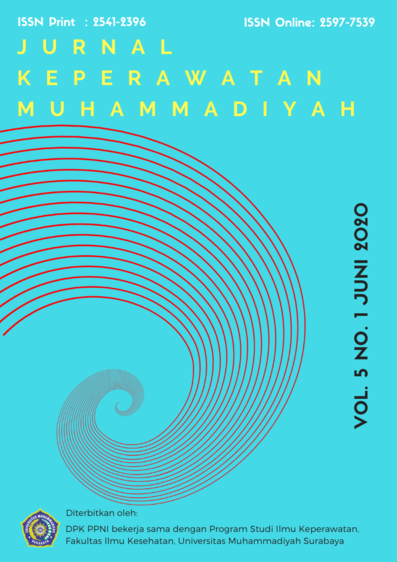Hubungan Antara Self-efficacy Dengan Kepatuhan Pemakaian Insulin Secara Mandiri Pada Pasien DM Di Rumah Sakit Baptis Batu
DOI:
https://doi.org/10.30651/jkm.v5i1.4712Keywords:
Self-efficacy, Obedience, Diabetes Mellitus, InsulinAbstract
ABSTRACTObjective : High level of obedience in using insulin independently in patients with diabetes mellitus is influenced by a person's level of self-efficacy. Methods : This study aims to know the correlation between self-efficacy and obedience of independent insulin use in DM patients at Batu Baptis Hospital. The type of research used is quantitative research using descriptive correlative research design with a cross sectional approach. Sampling used is convenience sampling technique with 125 respondents. Data collection used the DMSES questionnaire (The Diabetes Management Self-efficacy Scale) for the MMAS-8 variable self-efficacy and questionnaire (Morisky Medication Adherence Scale) for compliance variables. The data analysis methods applied the Spearman Rank correlation test. Results : The results of the Spearman Rank test is obtained that p value is 0,000 (p <0.05) and the correlation coefficient value is 0.824. It shows that the strength of the correlation is strong with the direction of the positive correlation. It can be concluded that there is a significant relationship between self-efficacy and obedience of independent use of insulin in DM patients in Batu Baptist Hospital. Conclusion : The higher the self-efficacy in patients is, the higher the patient's compliance with insulin injections. The suggestion of this study it is expected that DM patients who use insulin can be more adherent to undergo treatment with insulin.References
DAFTAR PUSTAKA
Alfian riza, 2016. Hubungan Atara Pengetahuan dengan Kepatuhan tentang Penggunaan Insulin Pada Pasien Diabetes Melitus Di Poliklinik Penyakit Dalam RSUD. DR. H. MOCH. ANSARI SAREL BANJARMASIN. Diakses pada 14/11/2017. http://www.id.scribd.com/jurnalilmiahibnusina,I(I),9-18,2016.
American Diabetes Association. 2012. Diabetes Basics. Alexandria. Tersedia dari: from: Diakses pada 14/11/2018. http://www.diabetes.org/diabetes-basics/.
Arikunto, S. 2010. Prosedur Penelitian Suatu pendekatan praktik. Jakarta: PT. Rineka Cipta.
Rizqi, 2018. Health Belief Model Pada Penderita Diabetes Melitus. Skripsi : Program Studi Psikologi Fakultas Paikologi dan Kesehatan Universitas Islam Negeri Sunan Ampel Surabaya.
Carlos De las Cuevas, Wenceslao Pe˜ nate, 2014. Psychometric properties of the eight-item Morisky Medication Adherence Scale (MMAS-8) in a psychiatric outpatient setting. International Journal of Clinical and Health Psychology. Diakses pada 27/05/2018. www.elsevier.es/ijcp.
D. Aditya, 2012. Mata Kuliah Asuhan Kebidanan Komunitas 1, Konsep Dasar Keluarga. Program Studi Diploma IV Kebidanan Komunitas Jurusan Kebidanan Poltekkes Surakarta.
Damayanti S, 2015. Diabetes Melitus & Penatalaksanaan Keperawatan. Yogyakarta : Nuha Medika.
Denny Anggoro Prakoso, 2015. Pengaruh Penggunaan Telemedicine Terhadap Kepatuhan Minum Obat Pada Pasien Diabetes Melitus tipe 2. Diakses pada 27/05/2018.
Friedman, MM, Bowden, VR & Jones, EG, 2010. Buku Ajar Keperawatan Keluarga: Riset, Teori, dan Praktik. Jakarta: EGC
Jackie Sturt , Hilary Hearnshaw and Melanie Wakelin, 2010. Validity and reliability of the DMSES UK: a measure of self-efficacy for type 2 diabetes self-management.http://dx.doi.org/10.1017/S1463423610000101Publisher statement: © Cambridge University Press 2009. Sturt, J. et al. 2009.
Jie Wang, MD, Rong-wen Bian, MD,Yong-zhen Mo, MD, 2012. Validation of the Chinese version of the eight-item Morisky medication adherence scale in patients with type 2 diabetes mellitus. Diakses pada 29/05/2018. Journal of clinical gerontology & geriatri www. E-jcgg.com.
Mulyani R, 2012. Kepatuhan Terapi Berbasis Insulin Pada Pasien Diabetes Melitus Tipe 2 Di Poliklinik Endokrinologi RSUP DR Sardjito Yogyakarta : jurnal Manajemen dan Pelayanan Farmasi, vol.2 no. 2/ Juni 2012. http://www.id.scribd.com/jurnalManajemendanPelayananFarmasivol.2no.2/Juni2012. Diakses pada 11/10/2017.
Mulyani risya, 2016. Hubungan Kepatuhan dengan Keberhasilan Terapi Berbasis Kombinasi Insulin dan Obat Antidiabetik Oral Pada Pasien Diabetes elitus Tipe 2 Di Instalasi Rawat Jalan Rumah Sakit Umum Daerah Ulin Banjarmasin. RAKERNAS & PIT.
Nabila, N. 2016. Gambaran Self-Efficacy Ibu Dengan Anak yang Sedang Menjalani Pengobatan Tuberkulosis di Poliklinik Spesialisasi Anak RSUD Cibabat Cimahi, Skripsi Tidak Diterbitkan, Universitas Padjajaran.
Notoatmodjo soekidjo. 2003. Ilmu Kesehatan Masyarakat dan Prinsip-prinsip Dasar. Jakarta : Rineka Cipta.
Downloads
Published
Issue
Section
License
- Penulis tetap memegang hak atas karyanya dan memberikan hak publikasi pertama kepada jurnal ini yang secara simultan karya tersebut dilisensikan di bawah:Â Creative Commons Attribution-ShareAlike 4.0 International (CC BY-SA 4.0)













